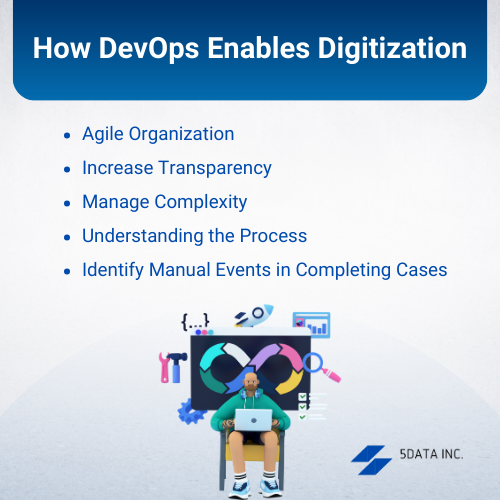What we cover in this blog
- The Impact of Digital Workflow and Automation
- Key Takeaways
- Understanding Robotic Process Automation (RPA)
- Exploring Digital Process Automation (DPA)
- RPA’s Role in Digitization
- Driving Digital Transformation through RPA and DevOps
- Process Mining in DevOps
- How DevOps Enables Digitization
- Synergizing RPA and DevOps Process Mining
The Impact of Digital Workflow and Automation
Digital transformation has various applications that can benefit businesses, including the development of mobile apps on low-code platforms for cross-departmental use, digital workflows, reviewing network security, and introducing configuration management tools. You can also digitize personal information, create chatbots with check box and unsubscribe functionality, or use big data to create infographic presentations. These technologies are essential for how we approach the digital age with IoT devices, mobile apps, and bots and can significantly improve daily workflows.
Key Takeaways
- RPA Promotes Businesses by Delivering Automation
- Identifying areas for digital workflow and automation
- Key Benefits of Digital Process Automation
- Digital Process Automation and Business Digitization
- Approach for implementing digital workflow and automation solutions
- Process integration solutions
Understanding Robotic Process Automation (RPA)
Robotic Process Automation (RPA) technologies are widely used to streamline workflows and automate repetitive tasks across various industries. These technologies enable businesses and software developers to use artificial intelligence, robots, machine learning, and chatbots to handle tasks that are human error-prone due to the tedious nature of manual processes.
RPA technology can be implemented in different ways, resulting in various use cases across sectors. Some common areas where RPA is mainly used include data migration, invoicing, data audits, and order processing. Even minor mistakes in these automated processes could result in significant losses of time, money, and resources, which is why RPA has become an essential tool for many businesses. Software application development company guides businesses through the automation process.
Exploring Digital Process Automation (DPA)
Digital Process Automation (DPA) is the implementation of digital technologies to automate and improve business processes across different areas such as finance, human resources, sales, customer service, and supply chain management. It involves integrating software robots, artificial intelligence (AI), machine learning (ML), robotic process automation (RPA), and workflow automation to streamline and automate workflows further, increase productivity, and enhance decision-making.
Digital Process Automation (DPA) has several benefits for businesses, including enhanced operational efficiency, improved agility and flexibility, cost savings, enhanced customer experience, and data-driven insights. Task automation, such as social media postings, invoice processing, Sales CRM updates, and automated ticketing systems, can significantly enhance enterprise operations and reduce costs. Robotic Process Automation (RPA) is one such solution that helps interpret tedious and repetitive tasks together, process transactions, automate responses, and establish communication between other digital systems.
RPA’s Role in Digitization
RPA assists in digital transformation processes in an organization in the following areas. Businesses use RPA to improve digitization with the assistance of the best automated functional testing services.
1. Reducing Costs
RPA systems can reduce operational costs by 25-60%, depending on your organization. Automating operations frees up staff for more challenging roles, increasing productivity and helping identify top talent.
2. More value for customers
Implementing RPA systems automates tedious tasks and digital workflows such as data entry, making processes seamless for all parties involved. RPA also uses artificial intelligence to guide customers through service workflows, resulting in customer satisfaction and a more efficient and satisfying experience.
3. Improved human resources
RPA automation in your enterprise can improve employee mobility, streamline task execution, and increase job satisfaction. Successful implementation of intelligent automation in one area can encourage its use in others, leading to a better employee experience and a better understanding of workplace challenges for your team.
4. Better opportunities
RPA helps businesses with digital transformation, consultancy services, and up-skilling their workforce. It keeps them updated with new business models and techniques and allows them to compete favorably within the industry.
Driving Digital Transformation through RPA and DevOps
There are three main components of driving digital transformation to success with workflow automation initiatives RPA and process mining:
- Defining the process and methodology:
- Determine which digital technologies to implement based on industry research. Monitor results to adjust as needed for optimizing business processes.
- Understanding objectives and key Metrics:
- To optimize progress in your organization, focus on people, not just cost. Define metrics specific to your business functions and operations and keep accurate records.
- Know the People:
- Executives should prioritize the people driving digital transformation through RPA, understanding their skill sets and enabling organizations to guide digital transformation and productivity.
Process Mining in DevOps
Process mining is a technology that helps businesses gain insights into their processes and performance. Its goal is to identify areas for improvement and determine whether changes are necessary and sustainable. Process management and task mining tools come with connectors that extract data from information systems like CRM, BPM, and ERP. They use this data to create visualizations of process flows in an organization, pinpoint bottlenecks, uncover underlying causes of inefficiencies, and identify variations and other inefficiencies in systems.

How DevOps Enables Digitization
a. Agile Organization
Process mining helps you to adapt to changes and make legacy systems in your organization more agile quickly. It enables continuous monitoring of processes and changes.
b. Increase Transparency
Process mining helps compare business areas by the number of repeated cases. It allows learning from best practices and reducing repeated events, thus shortening lead time.
c. Manage Complexity
Use task mining to identify complex business processes and simplify them for better workflow. Check complexity by business area. Best-performing regions have more possibilities per business process and variation.
d. Understanding the Process
Process mining systems visualize the steps in delivering to customers. It helps identify valuable activities and cut unnecessary ones. These tools provide insights into value-added activities on each business process management side.
e. Identify Manual Events in Completing Cases
Digital transformation reduces manual and automated workflows and makes processes faster and more efficient. Process mining identifies manual tasks and suggests improvements. Monitor RPA and new models by measuring all manual processes and events.
Synergizing RPA and DevOps Process Mining
Focusing only on RPA or other business process management or mining tools is inefficient. Business leaders need to understand how their organization operates before implementing any systems. Process mining identifies areas that will benefit most from RPA, such as automated regression testing services in the USA, which have the expertise to help firms. It enhances RPA’s functionality, making businesses more efficient. It also ensures that changes have a positive impact on the organization’s growth and processes.
Conclusion
Automation can kickstart digital transformation for businesses by combining low-code workflow automation, RPA, and ML. Start with simple processes and gradually tackle larger ones. Understanding RPA and process mining can accelerate digital transformation. The goal of digital workflow automation is to streamline business process management. Avoid implementing automation just for the sake of it, as it can lead to more complexity instead of simplifying tasks.
Frequently Asked Questions (FAQs)
How do robotic process automation RPA and digital transformation work together?
The Robot RPA software enables fast implementation of digital transformations by simulating employee actions from simple clicks and copy-and-paste tasks to complex transactions like banking reconciliations.
What is workflow automation in RPA?
The main difference between Workflow Automation and RPA is that Workflow Automation focuses on automating entire processes, while RPA is designed to automate individual tasks.
Is RPA a digitization?
A significant increase in precision and speed of data processing is achieved through RPA, which also helps accelerate data processing, digitization, and auditing. However, RPA alone is insufficient for effectively meeting all business requirements.
What is DevOps workflow automation?
DevOps automation can transform software development. It minimizes errors, boosts productivity, and promotes team collaboration by automating manual tasks throughout the SDLC.
How can DevOps help a company implement RPA correctly?
DevOps helps implement RPA correctly and align it with a company’s strategic goals. Without clear objectives, automating for the sake of automating can occur. Adopting DevOps practices can streamline implementation, improve collaboration, and ensure success.

